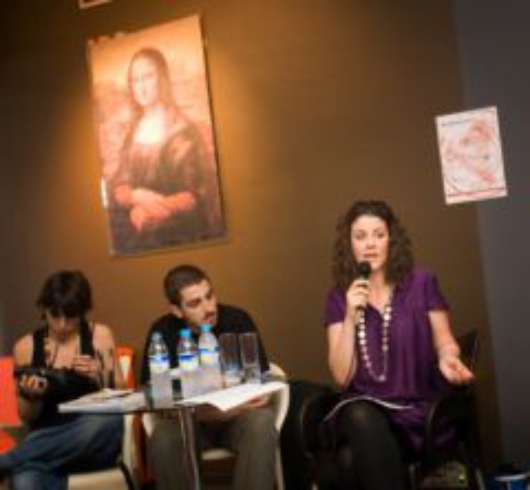Video surveillance: Freedom vs. Security?
Published on
 On April 26th, the Cafebabel local team in Seville organized a coffee-debate within the framework of the project 'Seville on the ground', in which five European journalists travel to a city and report about it. The chosen topic was the video surveillance in downtown Seville and the Zemos 98 Association was the special guest. The debate was moderated by Concha Hierro, and lasted approximately two hours.
On April 26th, the Cafebabel local team in Seville organized a coffee-debate within the framework of the project 'Seville on the ground', in which five European journalists travel to a city and report about it. The chosen topic was the video surveillance in downtown Seville and the Zemos 98 Association was the special guest. The debate was moderated by Concha Hierro, and lasted approximately two hours.
On the one hand, the issue of privacy was assessed: would cameras take freedom away from us? Many people maintain that life in the street wouldn’t be the same; people would be more repressed, they would feel watched over and stalked and wouldn’t do certain things because of embarrassment or for fear of their image being used for different purposes (as an example, it was cited: who would go into a sex shop, knowing that is being watched over?). Those who share this opinion believe that life in the areas under vigilance would be more monotonous: people would stop doing foolish things in the street, the couples wouldn’t kiss so much and laughter would be controlled. Daily things would become worries, although playing the fool kissing and laughing are not a crime at all.
On the other hand, some people believe that cameras can really provide more safety. They maintain that, although they are not “the” solution, cameras are an important starting point for, at least, reducing street crime. The case of the girl assaulted in the subway was cited to justify the importance of cameras in an event like this. If it weren’t for the images recorded, how would the aggressor be identified? Besides, those who share this view firmly believe that after a while, people would forget that they are being recorded and it wouldn’t affect their daily life. In their opinion, cameras are another means to try and protect people, and those who don’t behave badly don’t have to fear the introduction of video surveillance. 
A controversial issue was launched by one of the participants: Why to put cameras in the noble areas of Seville, like the C/ Sierpes and Nervion and not to put then in the 3,000 housing, where crime is really alarming? According to their reasons, if we don’t put the cameras where they are truly needed, there’s no need to put them in any other place. Those who agree with the setting of the monitoring system also maintain that those places need cameras more than other places, but in no way it prevents the installation from starting in the area where tourists concentrate and where it is easier to spot and catch a thief.
We finished the debate without reaching an agreement. The interactivity, the discussion, very well-argued interventions and the encouragement in the production of ideas were, no doubt, the strong points of the meeting; points which made all the participants think about a very important issue, not so emphasized as it should be.
Gabriela Azevedo Forlin
Photography: Bénédicte Salzes Translated by This project has been funded with support from the European Commission.Diana Irene Arancibia




